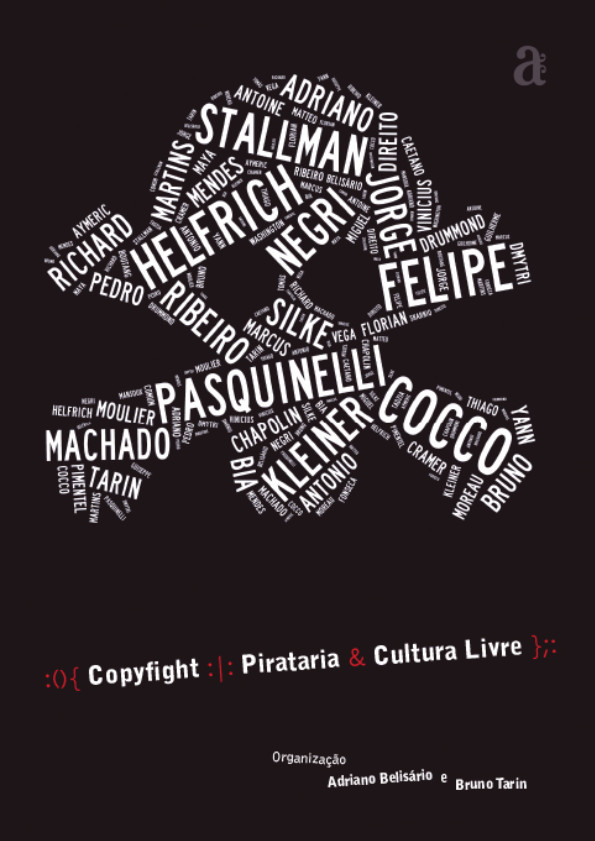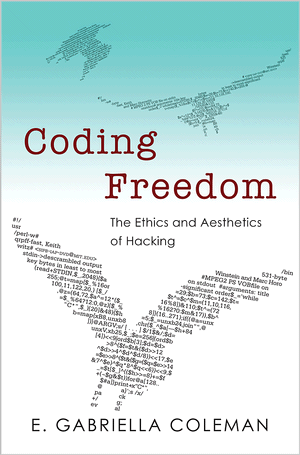Adriano Belisário, Bruno Tarin (eds.): Pirataria & Cultura Livre (2012) [Portuguese]
Filed under book | Tags: · copyleft, copyright, free culture, intellectual property, piracy

Copyfight is a collection of Brazilian Portuguese texts that aim to address some of the disputes around the topic of intellectual property, throwing new light on the subject and showing how such conflicts have impacts not only in the field of media culture, but also on our everyday lives, as well as on the production of machines, objects or food.
As stated in its introduction, “the goal of the book is not to broadcast a single view or a final proposal for the current issues about free culture and piracy, but rather unveil a multitude of reflections and practices. Copyfight does not refer to a world of perfect fittings, but a world of friction.” In this sense, the book develops a experimental to its reading, allowing the access of texts through thematic nodes or through the notes of the editors.
The project is the result of two meetings, held in 2010 and 2011 in Rio de Janeiro and gathers contributions from Giuseppe Cocco, Jorge Machado, f? erre!, Silke Helfrich, Matteo Pasquinelli, Richard Stallman, Beatriz Cintra Martins, Bruno Tarin, Pedro Mendes, Antonio Negri, Chapolin, Yann Moulier Boutang, Felipe Fonseca, Washington Luis Lima Drummond, Marcus Vinicius, Antoine Moreau, Dmytri Kleiner, Florian Cramer, Guilherme Pimentel, Aymeric Mansoux, Tadzia Maya, Tomás Vega, Thiago Skárnio, and Miguel Afonso Caetano.
Publisher Azougue Editorial, Rio de Janeiro, December 2012
Free Art License
274 pages
via Aymeric Mansoux
E. Gabriella Coleman: Coding Freedom: The Ethics and Aesthetics of Hacking (2012–) [EN, SC]
Filed under book | Tags: · aesthetics, anonymous, anthropology, code, computing, ethics, floss, free software, hacker culture, hacking, intellectual property, internet, internet activism, software, web

“Who are computer hackers? What is free software? And what does the emergence of a community dedicated to the production of free and open source software–and to hacking as a technical, aesthetic, and moral project–reveal about the values of contemporary liberalism? Exploring the rise and political significance of the free and open source software (F/OSS) movement in the United States and Europe, Coding Freedom details the ethics behind hackers’ devotion to F/OSS, the social codes that guide its production, and the political struggles through which hackers question the scope and direction of copyright and patent law. In telling the story of the F/OSS movement, the book unfolds a broader narrative involving computing, the politics of access, and intellectual property.
E. Gabriella Coleman tracks the ways in which hackers collaborate and examines passionate manifestos, hacker humor, free software project governance, and festive hacker conferences. Looking at the ways that hackers sustain their productive freedom, Coleman shows that these activists, driven by a commitment to their work, reformulate key ideals including free speech, transparency, and meritocracy, and refuse restrictive intellectual protections. Coleman demonstrates how hacking, so often marginalized or misunderstood, sheds light on the continuing relevance of liberalism in online collaboration.”
Publisher Princeton University Press, 2012
Creative Commons Attribution-NonCommercial-NoDerivs 3.0 License
ISBN 1400845297, 9781400845293
264 pages
Responses: Jo Bates, Denisa Kera, Brett Lunceford, Jorge Luis Zapico, Alexander Halavais, Stéphane Leman-Langlois, Ethan Zuckerman
Reviews: James Grimmelmann (Jotwell: Cyberlaw, 2012), David Banks (Cyborgology, 2012), Eric Raymond (2013), Cade Metz (Wired, 2013), Mike Doherty (Hashbang, 2013), Bruce Byfield (Linux Mag blog, 2013), Bryan Behrenshausen (OpenSource.com, 2013), Roy S. Gutterman (Journalism & Mass Communication Q, 2014), Tim Jordan (American J Sociology, 2014), Emily T. A. Earl (Techno_ethno, 2014), Anne Elizabeth Yaniga (Techno_ethno, 2014), Sebastian Kubitschko (Culture Machine, 2014).
Coding Freedom (English, updated on 2013-1-18, PDF, EPUB [updated on 2014-9-2])
Kodiranje slobode. Etika i estetika hakovanja (Serbo-Croatian, trans. Ljubica Gotić and Predrag Todić, 2014)
Andrew Barry: Political Machines: Governing a Technological Society (2001)
Filed under book | Tags: · citizenship, european union, governance, intellectual property, interactivity, neoliberalism, networks, politics, society, sociology of science, technology

Technology assumes a remarkable importance in contemporary political life. Today, politicians and intellectuals extol the virtues of networking, interactivity and feedback, and stress the importance of new media and biotechnologies for economic development and political innovation. Measures of intellectual productivity and property play an increasingly critical part in assessments of the competitiveness of firms, universities and nation-states. At the same time, contemporary radical politics has come to raise questions about the political preoccupation with technical progress, while also developing a certain degree of technical sophistication itself.
In a series of in-depth analyses of topics ranging from environmental protest to intellectual property law, and from interactive science centres to the European Union, this book interrogates the politics of the technological society. Critical of the form and intensity of the contemporary preoccupation with new technology, Political Machines opens up a space for thinking the relation between technical innovation and political inventiveness.
Publisher Continuum International Publishing Group, 2001
ISBN 0485006340, 9780485006346
320 pages
PDF (no OCR)
Comment (1)
